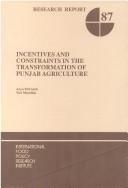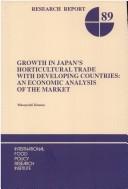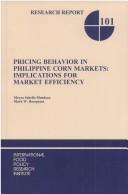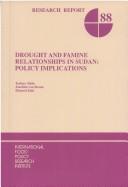| Listing 1 - 10 of 15 | << page >> |
Sort by
|
Book
Year: 1991 Publisher: The Hague : International Service for National Agricultural Research,
Abstract | Keywords | Export | Availability | Bookmark
 Loading...
Loading...Choose an application
- Reference Manager
- EndNote
- RefWorks (Direct export to RefWorks)
food security --- food security --- research --- research --- Research policies --- Research policies --- Technology transfer --- Technology transfer --- evaluation. --- evaluation --- resource management --- resource management --- Isnar --- Ifpri --- Africa --- Africa
Book
Year: 1989 Publisher: Wageningen : CTA,
Abstract | Keywords | Export | Availability | Bookmark
 Loading...
Loading...Choose an application
- Reference Manager
- EndNote
- RefWorks (Direct export to RefWorks)
ACP --- ACP --- Food production --- Food production --- International organizations --- International organizations --- Developing countries --- Developing countries --- Cta --- Ifpri --- Africa --- Africa --- Caribbean --- Caribbean --- Pacific Islands --- Pacific Islands
Book
Year: 1990 Publisher: Washington : International Food Policy Research Institute,
Abstract | Keywords | Export | Availability | Bookmark
 Loading...
Loading...Choose an application
- Reference Manager
- EndNote
- RefWorks (Direct export to RefWorks)
Marketing policies --- Marketing policies --- agricultural sector --- agricultural sector --- Production --- Production --- Price policies --- Price policies --- agriculture. --- agriculture --- Imports --- Imports --- Exports --- Exports --- foods --- foods --- Economic analysis --- Economic analysis --- Producer prices --- Producer prices --- Models --- Models --- Ifpri --- Pakistan --- Pakistan
Book
Year: 2006 Publisher: Washington, D.C., The World Bank,
Abstract | Keywords | Export | Availability | Bookmark
 Loading...
Loading...Choose an application
- Reference Manager
- EndNote
- RefWorks (Direct export to RefWorks)
Policies and external shocks affecting agriculture, the main source of income for rural households, can be expected to have a significant impact on poverty. The authors study the case of Uganda. Throughout the 1990s, more than 90 percent of its poor lived in rural areas and, during the same period, large international price fluctuations as well as an extensive domestic deregulation affected the coffee sector, its main source of export revenues. Using data from three household surveys covering the 1990s, the authors confirm a strong correlation between changes in coffee prices (in a liberalized market) and poverty reduction. This is highlighted by comparing the performance of different households grouped according to their dependence on coffee farming. Regression analysis (based on pooled data from the three surveys) of consumption expenditure on coffee-related variables, other controls, and time-fixed effects corroborates that the mentioned correlation is not spurious. The authors also find that while both poor and rich farmers enter the coffee sector, the price boom benefits the poorer households relatively more, whereas the liberalization seems to create more opportunities for richer farmers. Finally, notwithstanding the importance of the coffee price boom, the agricultural policy framework and the thorough structural reforms in which the coffee market liberalization was embedded have certainly played a role in triggering overall agricultural growth. These factors appear to matter especially in the second half of the 1990s when prices went down but poverty reduction continued.
Agricultural Activities --- Agriculture --- Alternative Crops --- Capita Incomes --- Coffee --- Coffee Farmers --- Coffee Market --- Coffee Prices --- Coffee Production --- Coffee Sector --- Commodity --- Cotton --- Cotton Production --- Crop --- Crop Prices --- Crops --- Crops and Crop Management Systems --- Export Crops --- Farm --- Farmers --- Farming --- IFPRI
Book
Year: 2006 Publisher: Washington, D.C., The World Bank,
Abstract | Keywords | Export | Availability | Bookmark
 Loading...
Loading...Choose an application
- Reference Manager
- EndNote
- RefWorks (Direct export to RefWorks)
Policies and external shocks affecting agriculture, the main source of income for rural households, can be expected to have a significant impact on poverty. The authors study the case of Uganda. Throughout the 1990s, more than 90 percent of its poor lived in rural areas and, during the same period, large international price fluctuations as well as an extensive domestic deregulation affected the coffee sector, its main source of export revenues. Using data from three household surveys covering the 1990s, the authors confirm a strong correlation between changes in coffee prices (in a liberalized market) and poverty reduction. This is highlighted by comparing the performance of different households grouped according to their dependence on coffee farming. Regression analysis (based on pooled data from the three surveys) of consumption expenditure on coffee-related variables, other controls, and time-fixed effects corroborates that the mentioned correlation is not spurious. The authors also find that while both poor and rich farmers enter the coffee sector, the price boom benefits the poorer households relatively more, whereas the liberalization seems to create more opportunities for richer farmers. Finally, notwithstanding the importance of the coffee price boom, the agricultural policy framework and the thorough structural reforms in which the coffee market liberalization was embedded have certainly played a role in triggering overall agricultural growth. These factors appear to matter especially in the second half of the 1990s when prices went down but poverty reduction continued.
Agricultural Activities --- Agriculture --- Alternative Crops --- Capita Incomes --- Coffee --- Coffee Farmers --- Coffee Market --- Coffee Prices --- Coffee Production --- Coffee Sector --- Commodity --- Cotton --- Cotton Production --- Crop --- Crop Prices --- Crops --- Crops and Crop Management Systems --- Export Crops --- Farm --- Farmers --- Farming --- IFPRI

ISBN: 0896290905 Year: 1991 Publisher: Washington International food policy research institute
Abstract | Keywords | Export | Availability | Bookmark
 Loading...
Loading...Choose an application
- Reference Manager
- EndNote
- RefWorks (Direct export to RefWorks)
Agricultural techniques --- Third World: agricultural and food problems --- Panjab [India] --- Agriculture --- agriculture --- Développement rural --- Rural development --- Adoption de l'innovation --- Innovation adoption --- Pendjab --- Punjab --- -Farming --- Husbandry --- Industrial arts --- Life sciences --- Food supply --- Land use, Rural --- Economic aspects --- -Agriculture --- -Economic aspects --- Farming --- agriculture. --- Developing countries: agricultural and food problems --- Ifpri

ISBN: 0896290921 Year: 1991 Publisher: Washington IFPRI
Abstract | Keywords | Export | Availability | Bookmark
 Loading...
Loading...Choose an application
- Reference Manager
- EndNote
- RefWorks (Direct export to RefWorks)
Plant husbandry --- Foreign trade. International trade --- Developing countries --- Japan --- Commerce --- Trade --- Importation --- Imports --- Horticulture --- horticulture --- Marché intérieur --- Domestic markets --- Vegetables --- Fruits --- Pays en développement --- Analyse économique --- Economic analysis --- Industrie alimentaire --- Food industry --- Japon --- Horticultural products industry --- -Horticultural products industry --- -Plant products industry --- Plant products industry --- Trade. --- horticulture. --- Ifpri

ISBN: 0896291049 Year: 1995 Publisher: Washington International food policy research institute
Abstract | Keywords | Export | Availability | Bookmark
 Loading...
Loading...Choose an application
- Reference Manager
- EndNote
- RefWorks (Direct export to RefWorks)
Plant husbandry --- Prices --- Philippines --- Recherche --- research --- Maïs --- maize --- Prix à la production --- Producer prices --- Facteur de production --- production factors --- Politique des prix --- Price policies --- Méthode statistique --- Statistical methods --- Moyen de production agricole --- farm inputs --- Concurrence économique --- economic competition --- Corn --- -Corn plant --- Indian corn --- Maize --- Zea mays --- Zea --- -Statistical methods --- Statistical methods. --- Corn plant --- -Statistical methods. --- Prices&delete& --- Ifpri

ISBN: 0896290913 Year: 1991 Publisher: Washington International food policy research institute
Abstract | Keywords | Export | Availability | Bookmark
 Loading...
Loading...Choose an application
- Reference Manager
- EndNote
- RefWorks (Direct export to RefWorks)
Crop damage --- Economic policy and planning (general) --- Third World: agricultural and food problems --- teeltschade --- Sudan --- Famine --- Sécheresse --- Drought --- Pluie --- Rain --- Guerre --- War --- Politique de développement --- Development policies --- Drought relief --- -Droughts --- -Famines --- -Food relief --- -Famine relief --- Food aid programs --- Food assistance programs --- Disaster relief --- Humanitarian assistance --- Public welfare --- Emergency food supply --- Food supply --- Starvation --- Drouth --- Drouths --- Weather --- Relief, Drought --- Government policy --- -Government policy --- -Drought relief --- Droughts --- Famines --- Food relief --- Famine relief --- Developing countries: agricultural and food problems --- Food distribution programs --- Developpement --- Ifpri
Book
Year: 2006 Publisher: Washington, D.C., The World Bank,
Abstract | Keywords | Export | Availability | Bookmark
 Loading...
Loading...Choose an application
- Reference Manager
- EndNote
- RefWorks (Direct export to RefWorks)
In this paper, the authors seek to answer three questions about poverty and forests in Malawi: (1) What is the extent of biomass available for meeting the energy needs of the poor in Malawi and how is this distributed? (2) To what extent does fuelwood scarcity affect the welfare of the poor? (3) How do households cope with scarcity? In particular, do households spend more time in fuelwood collection and less time in agriculture in response to scarcity? The authors attempt to answer these questions using household and remote-sensing data. They find that 80 percent of rural poor households in Malawi are likely to benefit from an increase in biomass per hectare in their community. Rural women respond to biomass scarcity by increasing the time they spend on fuelwood collection. But the actual decrease in consumption expenditure and increase in time in fuelwood collection are small and biomass scarcity is not associated with a reduction in agricultural labor supply.
Agricultural Labor --- Agricultural Output --- Agriculture --- Biodiversity --- Biomass --- Climate Change --- Crops and Crop Management Systems --- Deforestation --- Degradation --- Economic Theory and Research --- Ecosystems and Natural Habitats --- Energy --- Energy and Environment --- Environment --- Environmental Degradation --- Environmental Economics and Policies --- FAO --- Farmers --- Forest Products --- Fuelwood --- Harvesting --- IFPRI --- Industry --- Macroeconomics and Economic Growth --- Me Natural Resources --- Oil and Gas Industry --- Poor Households --- Population Growth --- Poverty Reduction --- Rural Development --- Rural Poverty Reduction --- Spacing --- Tobacco --- Trees --- Vegetation --- Wildlife Resources
| Listing 1 - 10 of 15 | << page >> |
Sort by
|

 Search
Search Feedback
Feedback About
About Help
Help News
News